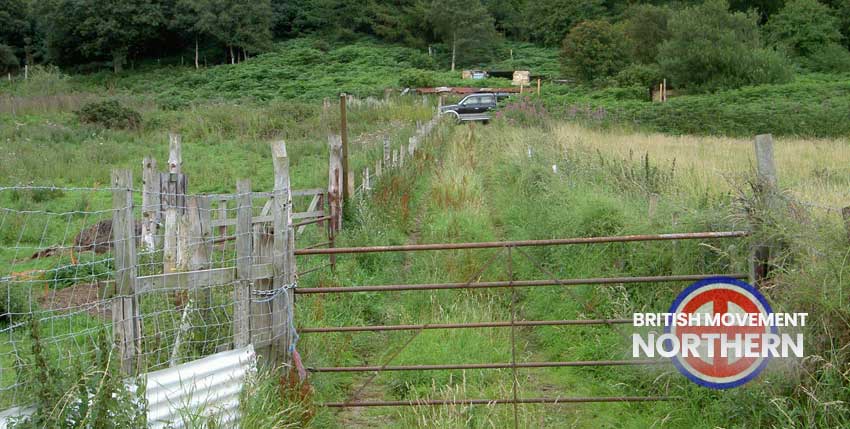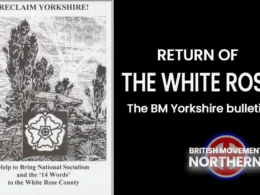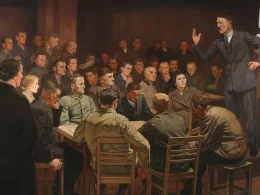The following article is taken from a speech originally given by the BM National Secretary at a meeting of the Yorkshire Forum in June 2016, and has been updated for this website. This is the first in a number of posts regarding the land and our environment.
In modern times, environmental or ‘Green’ politics has become the preserve of the political Left. Environmental political concerns are shaped and directed to fit into a Marxist narrative at worst, and by a soft-Left, social-democrat, ‘civil society’ activist stance at best.
The Greens ignore issues such as mass migration and immigration because for them the subject of ‘Race’ is taboo. The exception is the pressure group Population Matters, which regards all humanity and over population as a threat to the planet, a concern which includes mass migration but does not focus on race or ethnicity.
The modern ‘Green’ movement deliberately ignores the historical roots of environmental politics being firmly rooted in the politics of the Nationalist Right.
A Brief History of Green Politics – Europe – 1870’s to 1920’s, 1930’s and 1940’s.
Across the mid to late 19th Century a keen interest developed into European ‘peasant culture’, into ruralist and Folkish traditions, all of which easily developed into the Artaman League, later the National Socialist Reichsnahrstand, with bodies that embraced all aspects of farming and agriculture, forestry, environmental protection, and what today would be termed wildlife protection and ‘animal rights’.
Walter Darre – author of the book “Blood and Soil” (Blut und Boden) who became German Agriculture Minister in the National Socialist government was a pioneer of environmental and agricultural reform.
Herman Goring in his position as Reich Hunting Master established some of the first legally protected nature reserves in western Europe, and NS Germany was the first country in Europe to ban the use of steel jaw traps and ‘gin traps’ on the grounds of animal cruelty, as well as outlawing fox hunting.
The later legislation together with some draconian anti-poaching laws not surprisingly outraged upper class opinion in the Britain of the 1930’s. The modern day Greens conveniently overlook the animal welfare and wildlife protection legislation passed by the “Nazi regime”, nor do they acknowledge that the post-war German authorities were quick to abandon some of those ‘Nazi Green laws’ and prohibitions.
Elsewhere in 1930’s Europe, in the Netherlands, NSB member and political activist Florentine van Tonningen was a staunch advocate of ‘Blood and Soil’. Prior to her marriage to leading NSB official M. Rost van Tonningen, she had been a student of Professor Konrad Lorenz, an internationally acclaimed expert on animal behaviour and a pioneer of wildlife protection and environmental sciences.
In Britain, the early environmental movements had many strands dating back to the late 19th Century and into the early years of the 20th Century with the “Nordicists” and intellectual interest in “Agrarianism”’. The focus on concepts of ethnic-identity and historical roots of the British motivated both academics and established writers and artists such as William Morris and C S Lewis.
These writers were keen to explore themes of what was then termed, “Northern-ness” and featured in the books of William Morris, principally in “The House of the Wolfings” and “The Roots of the Mountain”.
Such ideas would later go on to influence JRR Tolkien, another giant of British literature who despaired at the destruction of forests and the countryside by the expansion of the Industrial Revolution. All factors which underpinned the early environmentalism of the early British Nationalists and emerging fascist movements in the 1920’s.
These included such figures as Arnold S. Leese, founder of the Imperial Fascist League, who was himself a veterinary surgeon, with a strong personal interest in animal welfare and the rural environment. He was a key figure in campaigns to outlaw Jewish ritual slaughter.
In the 1960’s and 1970’s Colin Jordan campaigned against both Jewish and Muslim ritual slaughter, first through the NSM and later through British Movement. Other British Nationalist organisations also took up the cause against ritual slaughter, with both the NF and BNP in the 1970’s, 1980’s and into the 1990’s voicing clear opposition to ritual slaughter. In more recent years BM activists have taken part in protests against Halal slaughter and the general sale of Halal meat. A BM meeting in Hull screened a shocking film revealing the brutal reality of Halal slaughter in modern Britain.
Back in the 1930’s Sir Oswald Mosley and the BUF were heavily involved in both rural campaigns and in environmental policies. The role and influence of the British Union of Fascists is of course ignored or denied by modern ‘Greens’. Sir Oswald Mosley in a speech in 1937 stated; “No nation can be great if the countryside perishes… Not only is the farming industry the first and greatest of the nation’s industries. A nation whose roots are not deep in the native soil cannot live in greatness.”
Henry Williamson, the author of such classics as “Tarka the Otter” and “The Story of a Norfolk Farm”, was an active member of the BUF. Williamson is a difficult figure for the Greens and the Left, especially in the early 1960’s when the ageing Williamson stood out in support of the anti-nuclear weapons protests and caused a degree of embarrassment to CND.
Elsewhere the BUF was heavily involved in defending farmers in East Anglia against having farms seized by the banks over debts accumulated in years of the Depression.
The Soil Association was largely founded by Jorian Jenks, Rolf Gardiner and other BUF agrarian activists. Post-war, Rolf Gardiner described himself as an “English rural revivalist”.

Animal welfare too, the British Anti-Vivisection Union, which was opposed to laboratory testing on live animals and also ritual slaughter (at this time kosher – Shechita slaughter) was founded by BUF activists. In later years the organisations name was shortened to the Anti-Vivisection Union in order to formerly break with past political association.
Some of the pre-1945 figures were key in developing modern concepts, Walter Darre continued to be actively involved in developing and promoting ‘Blood and Soil’ ideas in both Britain and Europe, although his profile was very much in the background. Darre maintained his association with British activist like Jorian Jenks.
The rejection of industrial society and the growing multiculturalism of the urban conurbations fuelled the rise or rather the resurrection of Nationalist involvement in ‘Green’ politics.
As one British Nationalist activist commented, “rootless cosmopolitans” fit easily into urbanised society, but still stand out as ‘alien’ in the rural environment, and cannot identify with ‘Blood and Soil’.
Post-1945 in both Britain and Europe there was a gradual re-emergence of Nationalist involvement in environmental politics and animal welfare. Colin Jordan included a good deal of ‘Green’ subject matter in the development of his political writings and the ideological foundations of the organisations he was involved in founding and guiding; the original BNP, NSM, World Union of National Socialists, the Northern Ring, and of course British Movement.
In Germany the NPD adopted a good deal of pre-war ‘Blood and Soil’ ideology and the German Left went to great lengths to try to exclude NPD and other German Nationalist from Green political events and publications.
In Spain the National Socialist organisation CEDADE was heavily involved in both folkish and environmental activities.
In the 1980’s in Britain “Rising” and the Third Position together with their allied organisations in Italy and France were very active in the promotion of a ‘Green agenda’ with much theoretical and ideological literature advancing those ideas, particularly with anti-urbanisation slogans like ‘Smash the Cities’ and ‘Back to the Land’.
As this article is being written, there have been widespread protests and blockages taking place across Europe; the farmers in France, Belgium, Germany, Italy, Spain and the Netherlands are staging large scale protests with convoys of tractors and motorway blockades.
Predictably the political commentators and journalists of the Left are pointing accusing fingers, a leading article in the Guardian on Friday January 19th 2024 declared that, “The Far Right’s exploitation of farmers has chilling echoes.”
The Guardian article by noted environmental campaigner and journalist George Monbiot, sought to remind the Guardian’s liberal and progressive left readership of the dark roots of the pre-1945 environmental politics, citing “At the tractor blockade in Berlin this week, some people displayed the flag of the Landvolkbewegung, a 1920’s antisemitic agrarian movement.”
Monbiot goes on to quote a liberal historian in stating, “It was in the countryside that both Mussolini and Hitler won their first mass following, and it was angry farmers who provided their first mass constituency.”
This is true in part, but the German National Socialists also built up strong followings in towns and certain districts of the larger cities. Monbiot also carefully ignores the role played by both leading National Socialist and Fascist thinkers in defining the foundations of what would later become environmental sciences and wildlife protection laws. Naturally, (no pun intended) the political Left and the Greens would like future generations to think that such ideas and measures were all down to their side of politics.
Although George Monbiot does acknowledge that, “nostalgic British farming movements led by fascist sympathisers such as Rolf Gardiner and Jorian Jenks. To be accurate Mr Monbiot these were not just “fascist sympathisers” but card-carrying members of the BUF.
The Left hate what they consider to be “blood and soil Nationalism” and since the late 1950’s the Green movement has worked hard to take control of all environmental political and pressure groups. The Greens have regularly warned about infiltration of their protests by “eco-fascism” or “environmental fascism”.
The current farming protests and pressure groups across Europe are a break with that leftist stranglehold and are causing the European Green parties a good deal of anxiety.
Here in the UK, British Movement has actively supported the farming protests in both England and Wales.
Blood and Soil is an important feature of British Movement policies and BM activists have regularly taken part in supporting the work of local nature reserves and coastal areas. A quick check through articles on the BM Northern region site will show how activists from BM North-West have taken part in litter picks and other clean up activities on the Sefton coast, and on nature reserves in Greater Manchester. Other BM activists and supporters have taken part in related activities in both East Yorkshire and West
Yorkshire.
Environmental/Green politics and activities are not the sole preserve of the political Left and never has been.
Credits:
Main Images: Stock image.
Lower Image: . Boosbeck: the site of Gardiner’s Cleveland work camp as it looks today. At Springhead and the nearby Gore Farm he organised Land Service Camps where a mixture of students, young unemployed “workmen”, miners, teachers and social service workers came from across England and abroad (mainly Germany) to stay in tents and volunteered to work on the land, sing folk songs, dance, enage in vigourous rambles and generally exchange cultures and ideas.
The British Movement welcomes articles for possible inclusion on this site from members and supporters across the North of England. Please remember that we have to operate within the laws of this country; we will not include any content that is against the current laws of the United Kingdom. News reports should be topical and relevant to the regions covered by this website.












